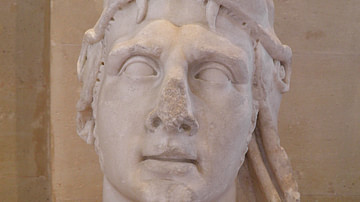Search
Search Results

Definition
Archelaus (Philosopher)
Archelaus of Athens (l. c. 5th century BCE) was a Pre-Socratic philosopher in ancient Greece who claimed the first cause of existence was the opposition of cold and heat which caused the separation of the universal essence to produce a plurality...

Image
Archelaus
Artistic depiction of Pre-Socratic philosopher Archelaus (fl. 5th century BCE) from the book Illustrium philosophorum et sapientum effigies ab eorum numistatibus extractae by Girolamo Olgiati, 1580.

Definition
Berenike IV
Berenike IV (r. 58-55 BCE) was queen of Ptolemaic Egypt and the older sister of Cleopatra VII (r. 51-30 BCE). She ruled briefly after her father Ptolemy XII was overthrown by a popular rebellion. Berenike IV's reign ended in 55 BCE when her...

Definition
Macedon
Macedon was an ancient kingdom located in the north of the Greek peninsula first inhabited by the Mackednoi tribe who, according to Herodotus, were the first to call themselves 'Hellenes' (later applied to all Greeks) and who gave the land...

Definition
Aytap
Aytap is the modern name for the ancient city of Iotapa (sometimes given as Iotape and Iotape Philadelphos) in Cilicia. The city's ruins are located in southern Turkey near modern day Alanya (ancient Coracesium). The city was founded in 52...

Definition
Publius Quinctilius Varus
Publius Quinctilius Varus (c. 46 BCE – 9 CE) was a Roman politician and general under the rule of Emperor Augustus. He is most remembered for having lost three Roman legions when ambushed by Germanic tribes in the battle of Teutoburg Forest...

Definition
Mithridates VI
Mithridates VI (120-63 BCE, also known as Mithradates, Mithradates Eupator Dionysius, Mithridates the Great) was the king of Pontus (modern-day northeastern Turkey) who was regarded by his people as their savior from the oppression of Rome...

Definition
Masada
Masada (“fortress” in Hebrew) is a mountain complex in Israel in the Judean desert that overlooks the Dead Sea. It is famous for the last stand of the Zealots (and Sicarii) in the Jewish Revolt against Rome (66-73 CE). Masada is a UNESCO...

Definition
Herakleia Lynkestis
Herakleia Lynkestis (Heraclea Lyncestis; Ἡράκλεια Λυγκηστίς) was a city in the ancient kingdom of Macedon not far from modern Bitola, founded c. 358 BCE by Philip II of Macedon (r. 359-336 BCE) as a governing centre for his new expansions...

Definition
Euripides
Euripides (c. 484-407 BCE) was one of the greatest authors of Greek tragedy. In 5th century BCE Athens his classic works such as Medeia cemented his reputation for clever dialogues, fine choral lyrics and a gritty realism in both his text...